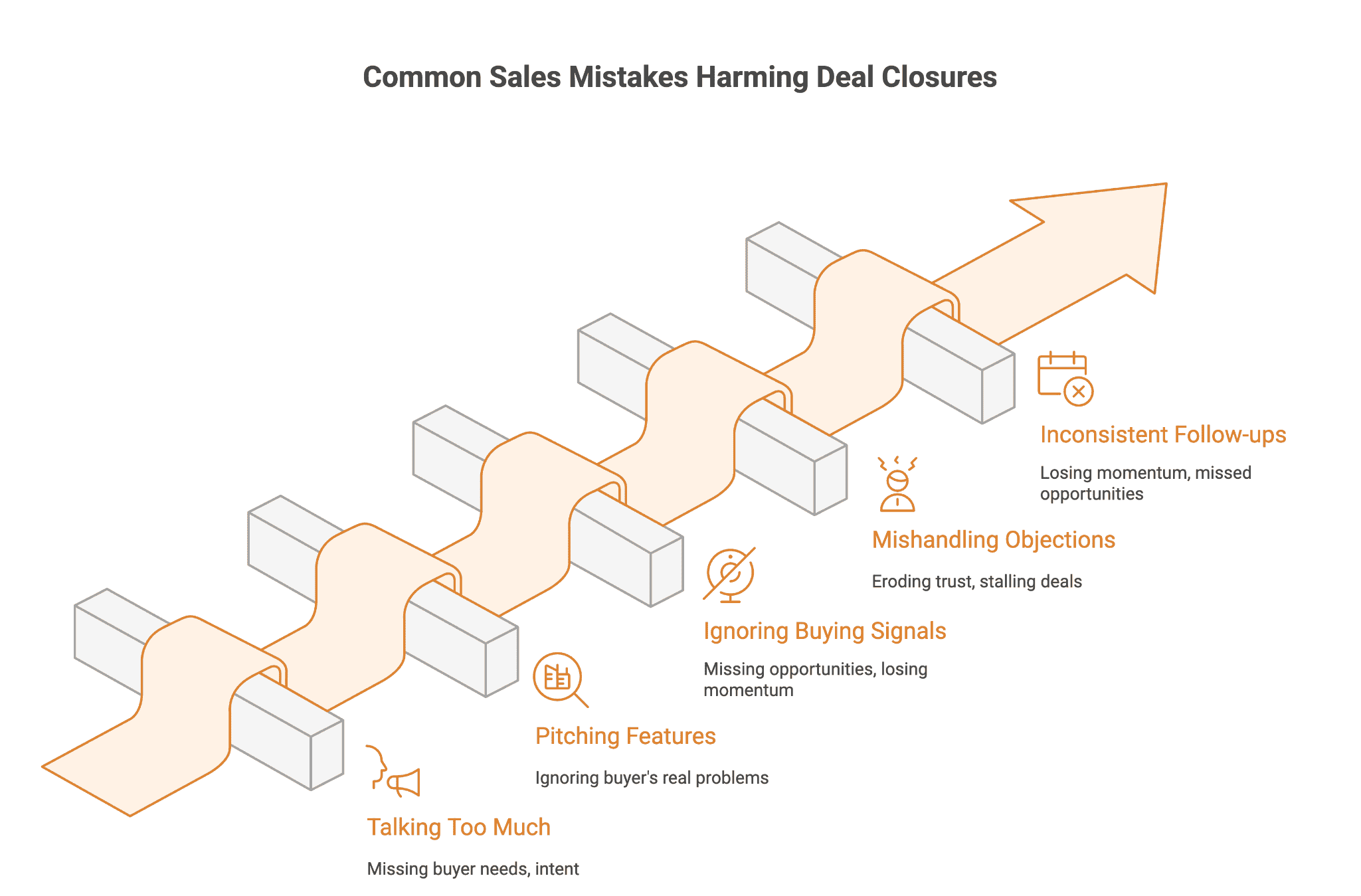
Top 10 Sales Mistakes and How Real-Time AI Can Fix Them
Most of your sales reps are losing deals because of tiny, invisible sales mistakes that stack up quietly. These are things that no one catches until the meeting is already over such as the reps dominating 90% of the call, they rattled off features instead of focusing on outcomes and they missed the subtle cues.
None of it was malicious. But the buyer walked away unexcited. And the deal? Gone.
Now combine that with this stat: 57% of the buying journey is already complete before a prospect even talks to sales (Forrester). That means buyers show up with expectations and not much patience. You get one shot to get it right.
The real problem here is that traditional coaching does not catch these things in time. It is always after the fact. That is where real-time AI flips the script. It listens live, detects cues, flags risks, and nudges reps to adapt while they are still on the call.
This blog breaks down the top 10 sales mistakes that are quietly killing your conversions and shows you exactly how AI sales tools can help your team avoid them in real time.
Why does real-time AI matter in sales?
In traditional sales coaching, you break down what went wrong, give feedback, maybe even role-play it next week. By then, the deal is already dead. That kind of “fix it later” approach is slow, reactive, and honestly, too late.
However, real-time AI Sales coaching acts like your rep’s in-call co-pilot, listening, processing, and nudging in the moment things start going sideways.
Here is how it works:
- It listens to live conversations between reps and prospects.
- It uses natural language processing (NLP) to understand the actual words and context.
- It delivers live prompts right there on the screen, based on what is being said by the prospect at that time.
What does AI sales change?
- New reps ramp up faster because they get help while they are learning.
- Conversations get more consistent across the team because everyone is getting the same in-the-moment nudges.
- Win rates increase as reps correct mistakes in real-time.
Real-time AI is the invisible coach that works 24/7, does not miss anything, and never forgets to flag a follow-up or a weak pitch.
10 common sales mistakes to avoid (and fix live)

Most reps have no idea they are making mistakes until the deal is already dead. Here are the 10 most common mistakes reps make on calls and exactly how AI tools swoop in to fix them before they spiral out of control. Let’s break them down.
1. Talking more than listening
The mistake:
We have all heard sales calls that sound more like podcasts. The rep keeps on talking without diving into product features, benefits and a few case studies. Meanwhile, the buyers barely get a chance to speak. This is not just awkward but also expensive. When reps dominate the conversation, they miss out on what really matters: the buyer’s needs, concerns, and intent.
The fix:
Real-time AI tracks how much your rep is talking versus listening and flashes a gentle nudge when they go off the rails. If the talk-time creeps above 60%, it prompts them to pause, ask a question, or hand the mic back to the buyer.
Why it matters:
Buyers want to feel heard. The more reps listen, the more they learn and the more trust they build. Listening uncovers pain points, earns credibility, and moves deals forward. Real-time AI helps reps shut up at the right time so buyers can open up.
2. Pitching features instead of values
The mistake:
Your sales rep gets excited about your product and starts rattling off every cool thing it does. While they are doing all that, the buyer is tuning out. This is because none of those things answers the question that is going on in the heads of your buyers. You are giving them a spec sheet when what they really need is a solution to a problem that keeps them up at night.
The fix:
Most buyers care about what your product does for them. You need to stop pitching what your product is and start showing why it matters. This way you help them, never make your brand sound salesy or pushy.
Why it matters:
People do not buy features; they buy outcomes. They are betting on a better tomorrow. When you shift from “here is what we built” to “here is how your life gets easier,” the entire conversation changes. It becomes less about specs and more about success. You move from seller to problem-solver, and that is what closes deals.
3. Ignoring buying signals
The mistake:
Your prospect casually talks about setting the budget aside or considering evaluation in the next quarter. Yet your sales reps keep rolling through their pitch as if nothing happened. Such a missed opportunity is harmful to your sales. And the worst part happens when they do not even realize they missed it until the deal slips away.
The fix:
This is where real-time AI steps up. It listens in with you, picks up on powerful intent keywords like “budget,” “procurement,” or “go-live,” and flashes gentle cues on your screen. So even if you miss something in the moment, AI has your back. You stay present, confident, and never miss a cue.
Why it matters:
When your buyer leans in, even subtly, you need to lean in harder. That is where the trust builds. That is how momentum picks up. And that is often the difference between another follow-up and a signed contract. Pay attention.
4. Mishandling objections
The mistake:
When a buyer says, “That sounds expensive,” your rep panics, either rushing into a discount or going radio silent. The deal stalls, and trust erodes. Most reps are not objection-proof. They are just unprepared.
The fix:
Here, real-time AI listens to live calls and instantly serves up objection-handling cards when tension rises. If a buyer raises a pricing concern, your rep sees a quick case study, a value-framing prompt, or a proven response right on their screen.
Why it matters:
Objections are buying signals. When your rep answers with calm, clarity, and relevance, buyers lean in. Real-time AI gives your reps the right words when they need them most, turning panic into poise and hesitation into progress. You give your team confidence on tap and your buyers the reassurance they need to say yes.
5. Inconsistent follow-ups
The mistake:
Often, your sales reps get caught up in other leads, forget to follow up, or send a half-hearted email a week later. By then, the moment’s gone. The prospect has cooled off or moved on. Your sales rep did the hard part, but dropped the ball at the finish line.
The fix:
Real-time AI has your back. Right after your call ends, it nudges your sales reps with smart reminders like, “Follow up in 2 days,” or “Here’s what to include based on what they asked.” It pulls key points from the conversation and plugs them into a ready-to-send template, so you are not starting from scratch or scrambling to remember what was said. It even tracks your overall cadence to make sure no warm lead goes cold.
Why it matters:
Most deals close after the fifth follow-up. If your sales reps are not staying consistent, you are leaving money behind. AI helps you follow through, so you do not have to rely on memory or sticky notes.
6. Not qualifying leads early
The mistake:
Your sales reps spend three weeks emailing back and forth, booking demos, looping in teammates, only to realise the hot leads cannot make a decision, have no budget, and just wanted to explore options. The worst part is that your sales reps could have figured that out in the first five minutes, if only the right questions had been asked.
The fix:
This is where real-time AI has your back. As your reps are talking, AI listens for missing details, like no mention of budget, timeline, authority, or need, and nudges you gently: “Ask about decision-maker,” “Confirm budget,” “Check timeline.” If you forget to qualify, AI reminds you. Again, if a buyer dodges the question, AI flags it..
Why it matters:
Qualifying early saves you hours chasing dead ends. It sharpens your pipeline, improves your forecast, and keeps your energy focused on deals that can close. Real-time AI makes sure you ask what matters, before wasting another minute.
7. Script dependency
The mistake:
Your sales reps have probably been on a call where they sounded like they were reading straight out of a manual. No matter what your rep said, they kept going, as if your response did not even register. That is script dependency. When your reps cling to scripts word for word, it kills the vibe. Buyers can feel the disconnect. It is robotic, it is rigid, and it is a fast way to lose trust.
The fix:
Real-time AI changes the game here. Instead of dumping a wall of text, it gives your reps dynamic cues, just-in-time prompts tailored to what is actually happening in the conversation. For example, if your buyer brings up pricing, AI nudges your rep with the right value statement. On the other hand, if someone mentions a competitor, AI feeds them a case study or differentiator.
Why it matters:
Since your buyers want a conversation, AI helps your reps show up like real humans with what your buyers actually need. Your buyers get a better experience, and your reps get better outcomes.
8. Forgetting context across calls
The mistake:
Reps often juggle 20+ deals at once, so it is easy to forget who said what, and when. But to the buyer it feels like you were not paying attention. Repeating discovery questions or missing key points from previous calls sends the message that they are not that important to me.
The fix:
This is where real-time AI earns its badge. Tools like Salesken surface your last call’s highlights right when you need them. While you are talking, it quietly feeds you past deal details.
Why it matters:
When you remember the details, you show up like a pro. Buyers feel seen, respected, and reassured. AI just helps you bring the right context at the right time.
9. Failing to personalize outreach
The mistake:
Mass outreach with zero relevance is not just ineffective, it is lazy. If you are sending the same pitch to a SaaS founder and a retail distributor, you are not personalizing. You are spamming.
The fix:
Real-time AI helps you ditch the spray-and-pray approach. As you type or call, it pulls in LinkedIn insights, company news, job titles, and past CRM notes, then nudges you with smart talking points. You get tailored prompts that make you sound sharp and genuinely interested.
Why it matters:
When you show buyers that you understand them, they respond. Personalization builds trust, gets replies, and makes you memorable. With AI in your corner, relevance is effortless, and you never sound like a robot again.
10. Not reviewing lost deals
The mistake:
If your sales reps never slow down to ask why that deal slipped through, they are just stacking avoidable losses. They miss patterns and coachable moments. As a result, your team keeps repeating the same missteps, hoping for a different result.
The fix:
This is where real-time AI becomes your quiet strategist. It auto-tags every lost deal and digs deeper than any spreadsheet ever could. You get instant visibility into what went wrong. It reads tone, flags objections, and shows you recurring blind spots across reps and teams.
Why it matters:
AI turns every lost deal into a crystal-clear learning moment, so that your team get better with every no. Since it's the fastest way to win more, learn fast from what you lose.
How can sales teams use Salesken AI to avoid these mistakes?
If you are managing different types of sales, you know your reps face a thousand tiny decisions on every call. Your customer sales representatives are under pressure to listen, qualify, handle objections, personalize, follow up, and close. Missing just one step can cost you the deal. That is where a smart AI sales assistant like Salesken.ai steps in—to guide your team in real time, without adding more tools or tabs to their day.
Here is how it helps you fix those mistakes before they happen:
- Live call guidance: It tracks talk-to-listen ratio and prompts your reps to pause, ask questions, and pitch outcomes instead of rattling off product specs.
- Real-time objection handling: It listens for friction points and instantly surfaces rebuttals, case studies, or product cues—right when your rep needs backup.
- In-call context: It pulls up past call summaries, CRM notes, and conversation history mid-call, so you never lose track of the buyer journey.
- Performance insights: It auto-analyzes lost deals, flags weak spots, and suggests smarter ways to approach future conversations, specific to each rep.
Whether you are scaling a new team or refining a seasoned one, Salesken helps every rep sound sharp, stay human, and win more.
Conclusion
Your reps are doing their best. But they are human. They miss cues. They overtalk and freeze on objections. They can forget details from the last call. Real-time AI changes that.
It gives you a smart, silent coach sitting in on every call, catching slip-ups as they happen, guiding reps with live nudges, and turning every conversation into a chance to win. So, if you are tired of reviewing calls, it is time to stop looking backwards and start coaching forward.
FAQs
1. What does real-time AI actually do during a sales call?
Real-time AI listens to live sales conversations, detects key moments and sends instant prompts to the rep. It acts like a live coach, helping your reps qualify better, handle objections smoothly, and stay on message without sounding scripted or robotic.
2. How does Salesken help customer sales representatives in their daily workflows?
Salesken integrates directly with your CRM and call tools to provide real-time support during customer interactions. It pulls up past call notes, offers contextual nudges, and analyzes performance per rep. Your team stays focused on the conversation while the AI assistant handles the heavy lifting behind the scenes.
3. Can real-time AI support different types of sales approaches?
Yes. Whether your team handles outbound prospecting, inbound discovery, consultative selling, or high-volume transactional deals, real-time AI adapts. It provides tailored prompts and insights that match each stage, style, and sales type, making it useful across diverse industries and team setups.
4. Will using an AI sales assistant make my team sound robotic?
Not at all. Unlike rigid scripts, AI assistants like Salesken offer flexible guidance based on live conversation flow. Your reps remain in control, sounding natural and confident, while AI quietly helps them avoid mistakes, ask better questions, and personalise the pitch in real time.
5. How does Salesken.ai improve deal conversion rates?
By helping reps listen more, respond smarter, and personalise conversations live, Salesken.ai reduces common sales mistakes. It also shortens onboarding time for new reps and improves consistency across the team. Better calls lead to better buyer experiences.

.png)
